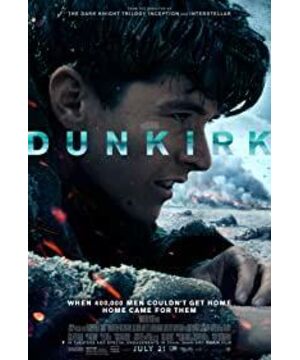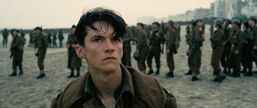I watched Dunkirk for the first time in a 70mm IMAX theater in New York, and then I went to Kindle to buy the movie script and read it carefully from beginning to end twice. I watched it twice in the cinema, and the result is that the experience of the second and third brushes far exceeds that of the first brush.
(By the way, in front of the Dunkirk script on the Kindle, there is a tens of pages of Jonathan Nolan’s interview with Christopher Nolan about Dunkirk. Christopher Nolan gave a lot of comments on the film’s music, plot, and creative background. Detailed and exciting discussions, after watching all aspects of the movie, you will have a deeper understanding of all aspects of the movie, highly recommended) The
second brush experience is better for three reasons: Nolan specifically mentioned in the script but many details that are easy to miss in the movie. Finally, this time I noticed it; the first time I understood all the lines that made me confused this time; this time I saw the foreshadowing details left by the non-linear narrative. This also corresponds to the three aspects I most want to discuss about this movie.
·
-Nolan’s little abacus- When
I was reading Nolan’s interview, I found a few points that were particularly interesting.
He did not shoot Dunkirk as a war film, but as a film about survivors. The Dunkirk Retreat and World War II are not the core of the story, but only provide a background and stage for the story. On the one hand, Nolan feels that he has never experienced war, so it is difficult to really make the essence of war movies. On the other hand, he believes that everything that needs to be shown about war in the movie has been explained by classic old movies such as "No War on the Western Front". It is nothing more than the cruel and tragic war, the old saying that war dehumanizes people, and it is basically difficult to speak new ideas. Therefore, he only intends to use the Dunkirk retreat as an entry point to tell a story about survivors.
The initial structure was very simple. Nolan even boldly proposed that he wanted to improvise directly without a script, but the producer's wife was annoyed by the producer's wife for being whimsical (seeing this paragraph and felt inexplicably cute), so he had to write the script honestly. He wanted to tell two parallel stories: an hour-long air force pilot's story, and a week-long escape story of young soldiers on the beach of Dunkirk. When writing the script, the third line was naturally added: the story of a small fishing boat that lasted for a day. So the three story lines cross each other, interlocking, and meet at the climax, which constitutes the entire plot of this movie. The script was completed very quickly at the end, with only 76 pages.
Many people criticize Nolan's films for always explaining the plot more than showing it, which is contrary to the purpose of "show don't tell" in film and television art. Obviously Nolan himself is aware of the existence of this problem. In the interview, he laughed and said that he felt that he had reached the pinnacle of this narrative style of explaining the plot through dialogue (the verb used in the original sentence was master), but he was also a little tired of this style (afterwards, he added: no , I'm not tired of it, but I want to try something else), so I want to return to the old-school silent movie style, try to tell this concise story with the lens, the scene, the actor's actions and eyes. He is also conceited: He is very happy that he is one of the few directors in the world who has the ability to invest hundreds of millions of dollars from a film company to make himself an anti-trend, experimental film.
Therefore, we saw in the movie few lines that were stingy, refined but effective acting skills, often a look, a nod, and a subtle physical movement can clearly explain the character's psychology, and then it is tight from beginning to end. The rhythm, there is not a waste shot, and there is not a second to let you breathe. Such a refined narrative technique was unprecedented in Nolan's previous movies. In this regard, I was very pleasantly surprised by his progress.
On the other hand, it is also destined that Dunkirk will be Nolan's most unpopular movie with ordinary audiences since he became famous, because with such a simple and simple plot, the whole movie can hardly arouse any emotional resonance from the audience. We don’t know who the protagonist is, what background, what personality; no one shivering with family photos, no one muttering that the war is over and marrying a girl in his hometown; the movie neither portrays the evil of the Nazis nor sings praises. The justice of the Allied forces; neither shows the choices made by the big figures in the historical context, nor expresses the glory of the small men bursting into humanity in desperate situations. Even the soundtrack is specifically abandoning the melody, almost completely becoming a tool to highlight the suspense. The whole atmosphere is very neutral and calm. Nolan even specially changed a few scripts that were too cruel (in the original version, the French Gibson was burned to death by the burning oil at sea), because he thought it would be counterproductive. The taste of war is over, and he hopes that the position of the movie is only to restore history rather than judge history. Why would he do this?
In the interview, Nolan mentioned that he interviewed a veteran who had participated in the filming of war movies after experiencing the war. He asked the veteran what aspect of the filming did not match his experience. The veteran thought about it and said about everything in the movie. People, from generals to soldiers, seem to understand what they are doing, and they all know in advance the outcome of the war and where they are. In a real war, you don't know so much background. You just try your best to kill the enemy and survive. In the end, it is often unclear whether you win or lose. You have to rely on the commander or the broadcast to tell you the result of the battle. In layman's terms, traditional war movies often make the mistake of "comrades, only half of the eight years of the War of Resistance".
Nolan is very fascinated by the situation where "soldiers who have experienced the war need someone to tell them the result of the battle." He hopes that he can restore this real chaos and unknown situation when shooting a movie with soldiers as the protagonist, so we can't see the generals and commanders in the movie strategizing in the conference room, and we can't see Hitler giving orders to the men. Even the German army never appeared head-on from the beginning to the end (except for the fighters), and only appeared when Tom Hardy was captured at the end, and it was deliberately blurred out of focus. Few people mention German or Nazi, just call them enemy. Nolan deliberately hides the presence of the enemy in the movie, creating a sense of ubiquitous oppression and deliberately diminishing the relationship between good and evil in the traditional World War II movies, while maintaining the perspective on the level of soldiers, trying to faithfully restore their own. Experience: escape, desperate escape. Soldiers did not know that when people looked back at the Dunkirk retreat decades later, they regarded it as an important turning point in the history of World War II; they just tried their best to escape the Dunkirk beach and cross the English-French Channel. When they returned to England in a small fishing boat with greasy faces and dejected faces, they thought they would be spurned by the people because of their status as the defeated army. They didn't expect to see Churchill's speech in the newspaper and the cheers of the people outside the train window. I realized that my embarrassed retreat and desperate escape were actually regarded as a great victory.
At the end, the male protagonist finished reading Churchill's speech in the newspaper and raised his head in a daze. It seemed that he couldn't believe this was the reality, and the movie ended at this moment. The confusion brought about by war and the unpredictable fate are the situations this movie wants to express.
So those who say that Nolan made a theme of World War II movie to Chong Austria, most of them have never seen the movie. This movie has no main theme at all, and its approach to war is completely different from the traditional academic perspective of humanistic care. Nolan made a very personal film. He hopes to make a breakthrough in his narrative skills. He hopes to express his views on history and war. As for whether these narrative skills and his way of looking at history are popular among audiences and judges, he actually doesn't care that much.
-Noisy war-
In the interview, Nolan emphasized an important concept of the film's soundtrack: Shepard Tone.
This is a common trick in music. See this on the English Wiki. The general idea is that there are three corresponding different rising voices through proper processing, which can produce an illusion of rising pitch, but in fact the voice is only in its own Constantly reciprocating cycle. He hopes to create a soundtrack that adapts to the entire movie through such a process, and maintain the tension of the audience through this fake rising music, creating an illusion of "what is going to happen soon".
It is Hans Zimmer who really made the soundtrack. His soundtrack this time is more experimental and extreme. As mentioned before, the melody and sub-tracks are almost eliminated. The music is almost a continuous whole from beginning to end, completely as a plot. The tools used to create the atmosphere sometimes stand out and sometimes mix with the background gunshot noise. In addition to the Nimrod selection (Elgar-Enigma Variation) from Elgar's Enigma Variation when the British army was rescued, there was also a little melody, which was almost purely atmospheric soundtrack, which could hardly be appreciated without the film.
Personally, I am not so satisfied with Dunkirk's soundtrack. It's not that it's not satisfied that it can't be put forward as an independent music appreciation like Interstellar - using a pipe organ to score a space movie is a magical pen, after all, it's hard to find - but the music is sometimes too much to grab the show. , There is a suspicion of overwhelming. The movie did make me obviously feel that the music had passed at least three times, once "Wait this will be calmer, you don't really need to hit me with a subwoofer", once "Hey, why do you suddenly get out of the DJ style", once "This music
Let’s see through the next scene.” Even Nolan himself mentioned in the interview that he felt that the climax of some of his previous movies was too tight, and there should be some room for the audience to breathe; however, in Dunkirk Obviously there are some such "breathing moments", but there is always background music tirelessly bombarding you behind, creating unnecessary suspense. I don't agree with some people's criticism of the film "there is nothing to force the suspense with the soundtrack"; I think that many segments of the movie do not need the soundtrack to support themselves, and too much soundtrack is a bit superfluous.
The more serious problem is that the dialogue is unintelligible. The first time I watched Dunkirk, I guess I didn't hear at least half of the lines. Obviously, part of this problem is that my English is too good, but I did not have this problem when I watched most other movies in the United States, and many people in European and American film forums also reported that Dunkirk and most of Nolan’s film lines are difficult to hear clearly. , Such as this hot post in the movie section of Reddit a few days ago: Why is the dialogue in Nolan's movies so difficult to hear? It proves that this is a common problem even in English audience circles.
This is actually Nolan’s old problem: in "Interstellar" there are several situations in which Hans Zimmer’s overwhelming organ music overwhelms the protagonist’s dialogue, although it is more of Nolan’s own choice of handling methods than Mistakes in late mixing. Nolan once specifically mentioned in an interview that he sometimes deliberately makes the dialogue sound not so clear, because he thinks that it is a very unreal experience for the audience to hear each dialogue clearly in noisy scenes in many movies. But is this really the best way to deal with it? I think he has overlooked one point: the short play caused by "Wait what he just said" caused by failing to hear the lines will directly affect the irreplaceable immersion brought by the cinema that Nolan has been pursuing. And a sense of scene. Dunkirk is not a movie with a complicated plot. The script is only 76 pages and the lines are very few, so inaudible lines usually do not affect the audience’s understanding of the movie’s story. It's fatal.
In addition, the movie's sound processing of war is almost perfect.
I have always admired Nolan's respect for reality in the sound processing of movies. All the shots in space in Interstellar Transition are muted as a good example. The restoration of various sounds of war in Dunkirk this time is also very real, from gunshots, torpedo explosions that almost frightened the entire movie theater, to the almost soul-stirring screams of the Stuka bomber when it dived, to the cabin of the fighter plane. The sound of metal plates rubbing and shaking is completely in place. The 70mm IMAX's audio-visual experience is unparalleled. Nolan once again eloquently proved the importance of going to the cinema to watch a movie with his own movie. At the same time, this is undoubtedly Nolan's most outstanding film in photography and mirroring so far, and every shot is almost perfect. I was particularly impressed by the minimalist and magnificent scene of the air force line, the sea and the sky.
-Why is it nonlinear again? -
previously referred to the concept Nolan fascinated by Shepard Tone, not only music, he hoped the three story intertwined with the main line can correspond Shepard Tone, the climax of a line followed by another line of high tide, creating a continuous back and forth Constant sense of suspense.
The plot itself is not complicated. One hour, one day, and one week three lines are cut together. It tells the story of how several soldiers escaped Dunkirk Beach with the help of civilian ships and the cover of the air force. Nolan mentioned in the interview that nonlinear narrative is not just his personal obsession, not just because he has been fascinated by the relativity of time; but when you want to talk about three different time spans and different characters at the same time. When participating in the story of the same event from different angles, nonlinear narrative is the only solution. Only in this way can you tell the story of the fighter pilot and the story of the fugitive soldier unobtrusively.
I asked a few of my friends. Although everyone said that the lines were confused, there was no problem in understanding the plot, and the relationship between the three timelines could be seen. And my experience with Dunkirk three times is that because this movie is different from Nolan’s other non-linear narrative works such as "Memories" and "Fatal Magic", none of it will give you a shocking reversal at the end, so even though The plot is simple, but it is actually a movie that can withstand rewatching. Many plots are unspoken but worthy of fun. Many of the corresponding clues and foreshadowings also asked me to shoot my thighs several times during the second viewing: it turns out that this shot is for this purpose!
The Rashomon-like suspense shaping drawn from different angles is also a wonderful technique. You first saw the soldier played by Kylian Murphy on the boat line in a state of panic and collapse after being rescued, and later on the soldier line you saw that this soldier was a calm and responsible commander before he was attacked by the submarine. Only then did you discover how great the psychological impact of war is on people; you first looked at the comrades who had landed on the water from the perspective of the air front Farrier (Tom Hardy) and waved for your safety, and then realized through the boat line that the pilot was not waving, and It was after struggling to escape from the stuck cabin to understand the chaos of war and the limitations of everyone's perspective. These clever suspense settings have been challenging your established understanding of the plot without leaving any traces. They are very clever.
Compared with Nolan’s first two films with much more complicated plots but too many loopholes (The Dark Knight Rise and Interstellar), Dunkirk’s plot benefits from streamlining, which is very balanced and perfect, and it is difficult to pick out the shortcomings. story.
But at the same time, this is also a story that lacks enough highlights.
Many people told Nolan after watching the screening that we don’t understand the death of George (the young boy who helped the father and son in the movie) in the movie. It’s not that we don’t understand what happened, but that we don’t understand this death. In terms of the plot, he just died so unclearly, what do you want to express? War makes people crazy? Soldiers lose their humanity? Not enough.
Nolan's answer was simple. George's death was meaningless. It was an accident. In the fight, he was unlucky and hit his head and died. He just wanted to express the impermanence of this fate.
In the same way, the Frenchman Gibson finally failed to escape from the silent tugboat. Why? Bad luck, the action was a bit slow. There is no other reason.
The pilot Tom Hardy's plane ran out of fuel and glided over the beach, and finally glided all the way to German territory, and was captured by the Germans after a forced landing. Why not make an emergency landing or use a parachute on the beach? As the unanimous MVP of the Battle of Dunkirk, he couldn't escape in the end. Does he have any effect and significance on the plot? It seems to be nothing.
So after watching the movie, I joked with my friends that the plot killing in this movie was too obvious, it was completely like "the director let you die, you have to die".
I respect Nolan's choice, but it is difficult for me to agree with the "impermanence of fate" as one of the main thrusts of such a compact movie. In the case that the structure of the story is so simple, instead of paying attention to all aspects of the plot, we choose to use "random" as the leading reason for the ending of several important characters. This cannot but say that the plot is correct. The compactness and continuity of the system have a very bad effect. -Conclusion
-
Nolan wrote and directed the entire Dunkirk. There are basically no big-name actors except Tom Hardy. It can be said that the biggest selling point of the whole movie is Nolan himself. I saw his strengths as always, saw his breakthrough to himself, and saw his still existing limitations.
I love Nolan very much, because in this era when everything is in line with money and sequel remakes are flying all over the sky, he is always stable and reliable to bring me unique surprises. Movies like "The Lost Lovers" and "The Seven Deadly Sins" are not made by David Fincher, and others will make them, but they will not be perfected by him; while "The Dark Knight", "Inception", and "Interstellar" "Nolan does not make such a movie, there is no second person on earth who would make it like this. After he became the most appealing director in the world at the box office, he still has the ambition to try to shoot Dunkirk, a style and theme he has never tried before, and after seeing all the movies he has made, I still can’t guess. What will his next movie look like. What else can such a director say besides cherishing?
Looking forward to Nolan bringing us more unique works.
View more about Dunkirk reviews











